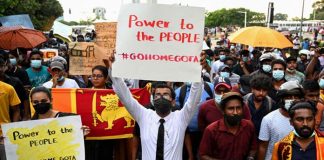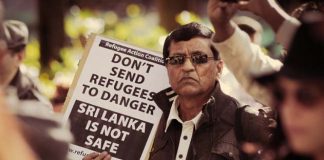A shock election defeat has brought an end to Sri Lankan President Mahinda Rajapaksa’s rule. But as yet there is no evidence of a substantial shift to ease the persecution of the Tamil people.
Over a decade of brutal and corrupt rule Rajapaksa established a near personal dictatorship, bolstered by his ruthless victory in the civil war against the Tamil Tigers.
Even during the election campaign opposition rallies were fired upon, state resources pillaged for Rajapaksa’s campaign, and the state media held under tight control.
Yet this couldn’t prevent his former health minister Maithripala Sirisena, who defected the day after presidential elections were called last November, winning with 51.28 per cent of all votes cast. Sirisena successfully attacked Rajapaksa’s regime over corruption and cronyism.
Allegations have surfaced the Rajapaksa and his Defence Secretary brother Gotabhaya summoned the army, police chiefs and the Attorney-General at 1am on election night, but failed to convince them to annul the elections and stage a coup.
Sirisena managed to pull together a broad, seemingly unwieldy coalition—winning the support of the conservative opposition United National Party by promising to appoint its leader prime minister. It also included the Sinhala Janatha Vimukthi Peramuna (JVP), and gained support from Tamils, Muslims, human rights organisations, and the hard-core Buddhist Jathika Hela Urumaya party.
Even among the Sinhalese who make up two-thirds of the population, although Rajapaksa won a majority (55 per cent), his relatively slender margin is astounding given his hero status six years ago after defeating the Tamil Tigers.
But given the new president’s ministerial role in Rajapaksa’s government, including as acting defence minister during the last two weeks of the civil war when some of the worst war crimes were committed, many are rightly sceptical that Sirisena will bring about justice for the Tamil minority.
Nevertheless, it was a very large Tamil voter turnout got him over the line. The Muslim minority, which has suffered a wave of communalist attacks from Buddhist fundamentalists, voted even more heavily against Rajapaksa.
The new president faces three main challenges: the restoration of democracy, inclusive economic growth, and a resolution to the Tamil question.
He has promised a range of reforms to abolish executive presidential power and to give more independence to the judiciary, the parliament, the army and police. It’s been reported that he’d like to reinstate Shirani Bandaranayake, the former Chief Justice impeached by Rajapaksa. If the current parliament, which includes many of Rajapaksa’s allies, refuses to approve this within 100 days, fresh parliamentary elections will be called.
Media censorship, including a ban on news websites, will be lifted and if we are to believe Sirisena, journalists will be free to challenge authority and expose corruption. The personal security apparatus of Rajapaksa’s brother Gotabhaya will be dismantled, and torture houses closed.
Sirisena’s manifesto promised to write-off 50 per cent of farmers’ loans, reduce fuel prices by removing taxes and to increase public servant salaries. He intends to increase public health and education spending.
He has cancelled some controversial development projects, including the licence for James Packer’s proposed casino, and a Chinese funded port city outside Colombo.
He also promised to move away from a reliance on Chinese investment and to improve soured relations with India, Japan, Europe and the US—which had become mildly critical of Rajapaksa’s excesses since the end of the civil war.
Tamils
Sirisena has talked of a partial demilitarisation of the Tamil majority north and east, but has not indicated when or how he would tackle broader social justice issues for Tamils and Muslims—including language rights, equal access to higher education and to the public service. No explicit promise has been made to open the refugee and prison camps that still hold thousands of Tamil-speaking people.
Moreover, while he’s open to an “independent” domestic investigation into war crimes and human rights abuses—including the massacre of at least 40,000 civilians in 2009—he refuses to cooperate with any international investigation.
The fall of Rajapaksa is also potentially a blow to the Abbott government, which shamelessly excused the regime’s torture and gifted it two frigates to help “stop the boats”. However the new government has already promised “continuing cooperation” on people smuggling.
While Sirisena has made a plethora of promises, unless forces emerge to challenge the Sinhalese chauvinism within the working class and stand up for the rights of Tamils and Muslims, the new government is likely to continue the policies of ethnic division.
By Mark Goudkamp





